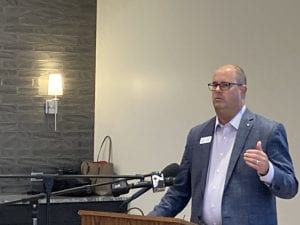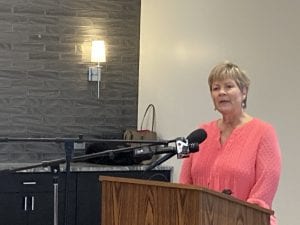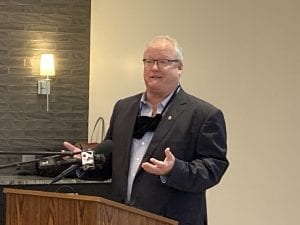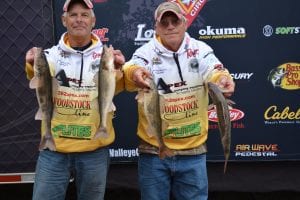Visit Quad Cities Tackles Covid, Hosts Leaders of Other Illinois Visitor Bureaus
East Moline – Leaders of the hospitality industry across the Quad-Cities and Illinois are trying to put a positive spin on an economy devastated by coronavirus.
Tuesday wrapped up a day and a half of meetings as Visit Quad Cities hosted the Illinois Council of Convention & Visitor Bureaus (ICCVB) for its fall conference at the Bend Event Center.

Dave Herrell, president/CEO of Visit Quad Cities.
“It was a great opportunity for Visit Quad Cities to host this event. We had 30 chief executive officers from around the state of Illinois,” Dave Herrell, president/CEO of Visit Quad Cities, said Tuesday, noting an additional 100 people who work in the industry attended virtually.
“What this demonstrates is, meetings can happen; events can happen in a safe and responsible way,” he said. The ICCVB represents 39 visitor bureaus across Illinois.
“We do everything we can to come back to our communities and make them stronger, more vibrant and position them for the future,” Herrell said. “Tourism is absolutely a critical force for recovery in this global pandemic. It’s something my colleagues in the room and virtually, for the last eight months, have been working around the clock to do the things we need to do, to make sure our communities are surviving; that they’re sustained and they will thrive.”
Working with the Illinois Department of Commerce and Economic Opportunity, Office of Tourism, ICCVB provides educational opportunities that raise the level of professionalism in the travel industry, and provides a forum for networking and cooperative action among the members.

Jayne DeLuce, board chair for ICCVB.
The organization also maintains a proactive legislative and advocacy effort on issues that affect tourism and business travel in Illinois.
“Our industry has been decimated through Covid,” Jayne DeLuce, president/CEO of Visit Champaign County and ICCVB board chair, said Tuesday. “We have reached an all-time low in our hotel occupancy. We have seen restaurants close. We have seen attractions not be able to open in the way they normally do, and people stopped traveling.”
“If you look at what is the silver lining in all that, how our organizations have pivoted to assist our communities in not only helping restaurants stay open,” she said.
“We’re coming upon colder weather – how will restaurants be able to operate when we’ve only been using outdoor dining? The destination marketing organizations we work so hard at have worked with other groups in our community to figure out how can we be safe, how can we stay alive?
“How can we let people know travel is OK on a safe basis and be able to do it with more driving, rather than flying,” DeLuce said. “I think at the end of the day, what I’ve learned being in Champaign, is that we’re about the residents. We’re about creating a sense of place for our residents. We’re going to support them first and foremost and after that, we’ll able to see visitors come when they’re ready and spend money in our community.”
Many restaurants shifted to curbside and takeout business in the spring, and that’s here to stay post-Covid, she said.
“Now the capacity is limited inside, and it’s not just with restaurants – it’s with attractions and hotels, and retail,” DeLuce said. “Retail has taken a huge hit…They went to online shopping, and that’s become more of a thing than it’s been, so how do we further support our local retailers so they are still here and here tomorrow.”
The Q-C hospitality sector has made the same pivot as those around the state, she noted.
“Do people want to go out to these places?” she said. “Our job is to let people know it is safe to eat locally, to shop locally, to visit attractions, and just make sure they do it safely. It’s very similar practices happening all over the state.”
Harsh economic numbers nationally
According to the American Hotel & Lodging Association, hotels nationwide have already lost more than $46 billion in room revenue due to

Dave Herrell, president/CEO of Visit Quad Cities.
Covid. This figure is devastating with hotels currently on pace to lose up to $400 million in room revenue per day, based on current occupancy rates and revenue trends.
STR and Tourism Economics are projecting revenue losses of 50% for the year.
The Bureau of Labor Statistics reported that 4.8 million hospitality and leisure jobs have been lost since February. With more than half of direct hotel employees laid off or furloughed, hotel workers are losing more than $1.7 billion in earnings each week. Individual hotels and major operators are projecting occupancies below 20%.
The Quad-Cities hotel occupancy is averaging between 45 and 50 percent, Herrell said. The region supports 8,270 tourism-related jobs (including hotels, bars, restaurants and attractions), including 6,500-plus hotel rooms.
“Chicago is 22 to 25 percent,” he said of hotel occupancy in comparison. “You hear all these other communities that are fraught with these challenges, but for us to be at nearly half, we’re punching above our weight a little bit.”
“From a national perspective, one in four hotel properties are having a challenge making that next mortgage payment,” Herrell said. “It’s not

Bill Geist, national destination marketing consultant.
only that, it’s attractions, restaurants, small business, and retail establishments.”
“We know we’ve got some challenges in the Quad-Cities from a tourism perspective,” he said. “In 2019, we saw another uptick and a record year. 2020 is not going to yield that, and frankly, and that’s OK. We understand – what’s important now is how we position for the future.”
“Just because the pause was like nothing we’d ever seen before in our industry, doesn’t mean we weren’t still selling – building relationships, advertising, marketing, communicating – doing the things we’ve been charged to do in our respective communities,” he said.
“We have to adapt; we’re all agile businesspeople,” Herrell said. “You have to operate in a different way.”
“A lot of it is local; what are we doing to get locals, and regain that consumer confidence?” he asked. “So they can feel that sense of, I can go out and eat in a restaurant. If I’m not comfortable doing that, I can take a different track and get takeout. How can I go to an attraction and feel safe and responsible, and still get that experience?
“How can you participate in an event and you have restrictions you have to adhere to?” Herrell said. “Travel and tourism can be done, and it’s something that needs to continue, because our economies are too important and they need to thrive.”
It’s a challenge in a bi-state area, with different state health regulations and restrictions for Illinois and Iowa, he noted.
“I think that’s what is unique about the Quad-Cities,” Herrell said. “Though we’re a little bit different, quirky and unconventional, that’s OK. I think the challenge for us, operating a bi-state regional destination is to make sure those relationships in Des Moines and Springfield are strong, communicative, responsive. That we’re learning and sharing information, and adapting, that we’ve got a seat at the table. And we do.”
The Q-C lost hundreds of public events in the past seven months, as well as hundreds of other small conferences and meetings, he said.
“In 2019, we generated $954 million in non-resident revenues, between Scott County and Rock Island County. We know that’s going to drop down in 2020,” Herrell said.
“The important thing is, how do you bring this collaborative energy back to the Quad-Cities?” he asked.
“We act as a region and behave as a region, and when the region can’t be lined up, because of certain guidelines or restrictions, it does put us in a challenging position,” Herrell said. “We’re going to continue to do the things that we’ve been doing for months – to advocate for our hotel industry, restaurant industry and attractions.”
Playing to the Q-C’s strengths
Part of the ICCVB presentations over Monday and Tuesday were from the heads of the Quad City Symphony, Figge Art Museum, Quad Cities Cultural Trust, Quad City Arts and River Music Experience – talking about what that sector means to area tourism.
 “They’re in a really volatile space and they’re exposed,” Herrell said. “It’s absolutely critically important that they survive this, because of their authenticity, what they bring to the community, the creative side of things, and how people emotionally connect with them.
“They’re in a really volatile space and they’re exposed,” Herrell said. “It’s absolutely critically important that they survive this, because of their authenticity, what they bring to the community, the creative side of things, and how people emotionally connect with them.
“It was great having that leadership around the panel,” he said. “It was a really healthy dialogue.”
“Tourism is really our love letter from our communities to the world,” said
Bill Geist, chief instigator at DMOproz (aka Zeitgeist Consulting), a firm specializing in strategic planning, governance, destination development and legislative issues.
He’s provided consulting to over 200 destination marketing organizations (DMOs) since 1995 and is a popular speaker on marketing, trends, and destination development across North America.
“No one is gonna invest in and move to a community they haven’t visited,” Geist said. “We are the first stage of economic development and destination marketing is the first stage of the recovery. If we’re not inviting people, once the protocols are in place, to ensure this is a safe environment, that’s going to be the most effective way to spur spending – to get people back to our restaurants, back to our attractions, and hotels. Everything flows from marketing.”
He noted strengthening tourism has a direct link to economic development – in attracting residents and businesses.
Geist said he didn’t expect so many visitor bureaus to pivot from an outbound (outside the region) marketing message to inbound – targeted to residents and businesses of the area.
“I was so proud of this industry, because it showed its resiliency, its ability to move on a dime,” he said. “These are the organizations that are going to help you recover.”
“We may never return to feeling comfortable in enclosed spaces. It may be years before people want to do that,” Geist said. “You have a wonderful hybrid in the Quad-Cities, with the outdoor recreational component.”
The Mississippi River reels in a big tournament
This region’s section of the world-renowned river will be the site of two championship fishing tournaments this weekend.
The 2020 Bass Pro Shops and Cabela’s Masters Walleye Circuit (MWC) is set to wrap up a unique season Oct. 8-10, along the Mississippi River, with the 2020 World Walleye Championship (WWC) in the Quad-Cities.
The world championship event is a “qualify only” event; in other words, only the very best of the best will attend. The 58 best walleye anglers anywhere will compete after qualifying for this opportunity by finishing atop the 2019 MWC regular season events held across the country, including events at the Illinois River, IL; Detroit River, MI; Big Stone Lake, MN; Lake McConaughy, NE; Lake Erie, OH; Bay of Green Bay, WI; Devils Lake, ND; and Leech Lake, MN.

Participants of the Masters Walleye Circuit show off their fishy haul.
The World Championship contenders will launch each morning from Sunset Marina in Rock Island, and will look for a maximum five-fish limit of Walleye, Sauger and Saugeye, at least 4 of which must be 15”- 20” long and are allowed only one fish per angler over 27” in their bag to weigh-in as there is a protected 20”-27” inch slot on the river.
Total payout at the World Walleye Championship will push $120,000 in cash and prizes, the bulk of which is cash and includes multiple added funds thanks in part to Ranger Boats and the $1,000 Ranger Cup Bonus, Lowrance and their $500 HDS Live/Elite Ti2 bonus, $500 Airwave Seat Pedestals, T-H Marine Atlas Awards, more than $10,000 in cash and prizes added to the pot by TWF/MWC as well as custom made trophies and the always coveted World Championship custom rings. Every team in attendance will receive a prize check.
The event will be filmed for the Federation Angler TV’s block in primetime network TV on the Pursuit Channel, which broadcasts to over 40 million households as well as other networks across the nation.
Everyone can watch online at masterswalleyecircuit.com or on their Facebook page facebook.com/MastersWalleyeCircuit.
Also, the Fishers of Men National Tournament Trail leads to the Quad-Cities for the 2020 Berkley Team Series District 11 Championship on Thursday through Saturday. Approximately 30 visiting anglers will launch in Albany, Ill., to seek and catch the most bass. They’ll most likely be in Pools 13 & 14 (between Albany and LeClaire).
“We are thrilled to host these amazing events in the Quad-Cities regional destination,” Dave Herrell of Visit Quad Cities said. “Activating our global asset, the Mississippi River, in a meaningful way accelerates our brand by bringing and hosting some of the best fishing events in the country to the Q-C. We look forward to a few exciting days on the river.”
“We’ll get some national television exposure out of it, which is great,” he said.
Under the umbrella of The Walleye Federation (TWF), the Bass Pro Shops and Cabela’s Masters Walleye Circuit is North America’s longest-running and undisputed leader in team walleye tournaments and as an inductee into the freshwater fishing hall of fame, has set the standard for competitive walleye fishing for 36 years and is open to all avid walleye anglers, according to a VQC release.
For more information, visit masterswalleyecircuit.com.









